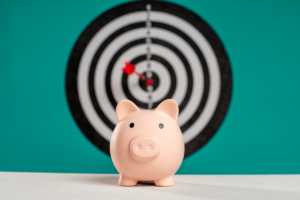How to Get Your Finances on Track With a Money Date

How Credit Score Ranges Matter
07/02/2023
6 Reasons Why Having a Good Credit Score Matters
07/16/2023 It’s often a challenge to stay on top of household finances. Whether you are managing money by yourself or with a partner, life tends to get in the way of financial decision-making. If you have trouble setting aside time for financial planning, a money date might be the perfect solution.
It’s often a challenge to stay on top of household finances. Whether you are managing money by yourself or with a partner, life tends to get in the way of financial decision-making. If you have trouble setting aside time for financial planning, a money date might be the perfect solution.
Let’s explore what a money date is, why you should make one, and how to plan one.
What Is a Money Date?
A money date is a scheduled money conversation. Typically, money dates happen between significant others. But planning a money date with yourself can also be helpful.
The defining feature of a money date is that it is a marked event on your calendar. Instead of waiting to find free time to consider money matters, a money date encourages you to carve out time in your busy schedule to talk about money.
For many households, a money date is not a one-and-done event. It’s often helpful to schedule regular money dates. For example, you might schedule a money date once a month to monitor progress toward financial goals.
Why Make a Money Date?
A money date can transform your finances. Here’s a closer look at some of the reasons you should set a money date.
Set Household Financial Goals
It’s important to stay on the same page about money matters, but this is often easier said than done. It’s especially difficult if you don’t regularly communicate your money goals.
A money date gives you and your partner the venue to discuss your financial goals. You can talk about your shared dreams and how they relate to money. For example, you might dream of buying a house or taking a romantic vacation together, which will factor into your financial decisions.
As a couple, these money conversations can help you set firm household financial goals. When everyone’s on the same page, it’s easier to make progress.
Learn to Talk About Money
In our society, money is a sensitive topic. A recent survey found that 56% of American adults consider it a taboo topic. Although many are uncomfortable talking about money, it’s an important topic for partners to get comfortable talking about together.
Since money is such a significant part of life, many of us have emotional ties to financial decisions. By sharing your money motivations with your partner, you might both come to a better understanding of each other. For example, you might learn that your partner is adamant about saving because they experienced tight financial times as a child.
Regardless of your money background, it’s never a bad idea to start talking about finances. Households have to make major financial decisions, and you’ll eventually need to have a money conversation. But in the forum of a money date, the conversation can be more relaxed instead of a tense standoff.
Track Progress Toward Financial Goals
Households share financial goals. As you make progress, you can use money dates to track your progress toward your shared goals.
For example, let’s say you have the shared goal of buying a house. A few related goals might include saving up a down payment and boosting your credit score.
After setting up these goals, regular money dates can help you monitor progress and celebrate your wins.
Give Money Topics the Floor for an Hour
Talking about money topics can be hard. But it’s essential to talk about major money decisions and goals. A money date allows you to set aside an hour or so to talk about financial decisions on the horizon.
Instead of pushing off the talk, a money date forces everyone in the household to devote some time to thinking about money. A focused effort on your money for a short amount of time can pay off in a big way.
How to Plan a Money Date
If it sounds like a money date is what your household needs, then it’s time to start planning one. Below you’ll find a step-by-step process for planning your very own money date.
Set the Date in Advance
A key feature of planning a money date is putting it on the calendar.
If you are planning a date with your partner, they’ll appreciate some heads up about this money date. Picking a date without their knowledge might feel more like an ambush than a joint experience.
If you are planning a money date for yourself, putting it on the calendar will help you stick to the plan. Otherwise, it’s easy to continue putting off money matters until another day.

To get started, pick a single date on your calendar. After your first money date, you might set a recurring event with your partner. Personally, my spouse and I have a money date on the first of every month.
Make It an Enjoyable Date Night
The word “date” implies an enjoyable evening. It’s helpful to keep the theme of enjoyment during a money date. For many, money brings up negative emotions and leads to arguments. For your money date, try to create an atmosphere that’s enjoyable for both parties.
A few ideas include heading to your favorite restaurant, putting on a favorite playlist, making a special meal, or having a delicious dessert. Regardless of your method, it’s a good idea to make a money date a fun time.
Hopefully, you’ll both start to look forward to your money date. If it’s an enjoyable night, it might not be hard to make it a regular occurrence.
Prepare in Advance for the Date
In many ways, a money date equates to a household finance meeting. Don’t show up to the date without any preparation. Instead, come to the table with an agenda of things to talk about.
If possible, bring along your laptop or phone to look up financial details. For example, you may want to check in with your budget or check on your investments together.
Remember that both parties are decision-makers. Instead of laying out your plan without any input, consider building a financial plan that suits both your needs and desires. It will likely take more than a single money date to come up with a solid shared financial plan, but these scheduled conversations can get the ball rolling.
Also, consider giving some thought to what you want out of your financial life. If you already know a general direction, it can be easier than starting from scratch during your money date.
Make a List
A list can help you hit every money topic on your mind. Without a list, it’s easy for the conversation to get off track. Heading into the date with a list can keep your money dates on topic.
A few items you might include on your list include:
- Reviewing spending and the budget: Look over your shared spending. If you spot areas that went off budget, brainstorm together on ways to stay on track next month.
- Discuss short-term changes: Financial changes can stem from any number of life events. For example, one partner might get a raise or take time off work for health reasons. Consider how these changes impact household finances.
- Dream together: Whether we like it or not, money is intricately tied into our life goals and decisions. Taking the time to consider how your shared dreams will impact your finances is critical. For example, a dream honeymoon, retiring at a reasonable age, or becoming a stay-at-home parent each have financial strings attached. Dream big together, and map out how these dreams will impact your financial goals.
- Monitor progress toward money goals: When you have shared financial goals, a money date is the perfect time to monitor progress. You can see how far you’ve made it together since your last check-in.
- Bandwidth check-in: Making progress toward shared financial goals is exciting. However, it’s okay to decide on a slower pace. Discuss how you each feel about your workloads. If you are working too hard, taking a break is often better than burning out completely.
Everyone will have a slightly different money date to-do list. And the topics you plan to discuss at each money date may change along the way. The key is to keep the lines of communication open while making any adjustments on your shared financial journey.
Be Mentally Ready for Tough Conversations
Money is often an uncomfortable topic to broach. After all, most of us consider talking about money to be taboo. A money date can give you the venue to talk about money with your partner openly. However, the process will likely come with some difficult conversations.
Instead of gearing up for a fight, approach money dates with an open mind. Although there will be some tough conversations, working through money issues together is often good for the entire household.
As you enter a money date, do your best to avoid any judgment. It’s impossible to change the past. And making your partner feel bad about money mistakes isn’t the right path to pursue. When you and your partner make money mistakes, look for solutions that work for both parties. Although the conversation might get uncomfortable, it’s better to deal with money issues as quickly as possible. Otherwise, things can get significantly worse.
Talk Through Any Potential Changes
Money goals change along the way. It’s natural for you and your partner to see financial changes throughout your life together. While change can be a good thing, it’s helpful to understand the impact of any change on your financial situation.
For example, you might see the possibility of a career-related move on the horizon or plan to adopt a pet together. Either would come with impacts on your budget. Life will continue to throw surprises your way.
If possible, make a plan for the financial changes. Additionally, consider building a shared emergency fund to get your household through any unexpected hits to your income. A shared emergency fund can help you stay afloat while making course corrections together.
Celebrate Progress Toward Shared Goals

Money dates might include hard conversations. But that’s not the only thing to keep in mind. It’s also helpful to celebrate your financial wins during a money date. Your wins can be big or small. Whether you managed to stay on budget together or finally topped off your emergency fund, don’t forget to celebrate.
While you’ll likely always have another money goal on the horizon, make time to celebrate your wins along the way.
Pencil In Your Next Money Date
At the end of your money date, consider putting the next one on your calendar. While a single money date is a great place to get started, consistent money dates can help you and your partner stay on track toward financial goals.
In many partnerships, one partner is more interested in talking about money than the other. A money date is a win-win for everyone. The person interested in money has a scheduled time to feel heard and bring up the money matters on their mind. The person less interested in talking about money can mentally prepare themselves for the necessary conversation.
The right cadence of money dates varies based on your situation. If you are just getting started, a weekly money date might be helpful as you extricate yourself from the paycheck-to-paycheck cycle. When you have a stable financial situation, a monthly or semi-annual money date might be enough to stay on track.
The Bottom Line
A money date might be just the thing you need to get your household finances on track. While the idea of a money date might not sound glamorous, it can be an enjoyable experience. It often takes some hard conversations to open the door to productive money dates with your partner. But sticking with a regular money date can help you both stay on track toward your shared goals.





1 Comment
Great suggestions for the Money Date. Very insightful too regarding ways to approach the money discussion & perks of how to ensure you’ll have a beneficial experience for the both of you.